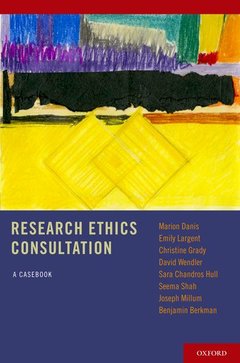Research Ethics Consultation A Casebook
Langue : Anglais
Auteurs : Danis Marion, Largent Emily, Grady Christine, Wendler David, Chandros Hull Sara, Shah Seema, Millum Joseph, Berkman Benjamin

Interesting and important ethical questions confront researchers, regulators, institutional review boards, support personnel, and research participants committed to the ethical conduct of human subjects research at all stages of research. Questions encompass - but are not limited to - study design, enrolling participants, balancing the clinical needs of participants against the research agenda, ending trials, discharging post-trial obligations, and resolving conflicts. Straightforward solutions to these types of questions are often not found in regulations, ethics codes, or the bioethics literature. These resources may leave room for interpretation, offer conflicting guidance, or simply fail to address particular questions. Ethics consultation, which has been offered in clinical care settings with regularity since the 1980s, has since the turn of the century increasingly been sought in the clinical research context. Because there has only lately been recognition that ethics consultants can play a valuable role helping the research community conduct research in the most ethically informed way, there are many open questions in the field of research ethics consultation including the appropriate role of consultants and the best methods of consultation. The Clinical Center Bioethics Consultation Service has been serving the NIH community of researchers, administrators, healthcare providers, and research participants for more than a decade, conducting nearly 1,000 consultations in that time. In this book, members of the Bioethics Consultation Service reflect on this long track-record and unparalleled range of research ethics consultations to share a collection of their most interesting and informative research ethics consultations and to start a dialogue on remaining open questions. Although the NIH experience is unique, this book focuses on cases - and associated lessons - that are generalizable and valuable for the entire clinical research community. This book will be valuable to ethics consultants, clinical investigators, students and teachers, and others desiring insight into clinical research ethics and ethics consultation.
FOREWORD. INTRODUCTION. CHAPTER 1: STARTING RESEARCH. CONSULT 1.1: ASSESSING SOCIAL VALUE. CONSULT 1.2: ASSESSING SOCIAL VALUE FOR LOCAL POPULATIONS. CONSULT 1.3: ASSESSING SCIENTIFIC VALIDITY. CONSULT 1.4: PLACEBO CONTROLLED TRIALS. CONSULT 1.5: STANDARD OF CARE. CONSULT 1.6: RECONCILING DIFFERENT JUDGMENTS REACHED BY MULTIPLE IRBS. CHAPTER 2: ENROLLING RESEARCH PARTICIPANTS. CONSULT 2.1: USE OF NON-MEDICAL CRITERIA IN DETERMINATIONS OF STUDY INCLUSION OR EXCLUSION. CONSULT 2.2: EXCLUSION OF AN INDIVIDUAL BASED ON A NEW CO-MORBIDITY. CONSULT 2.3: ENROLLING STAFF MEMBERS IN CLINICAL STUDIES. CONSULT 2.4: IDENTIFICATION OF POTENTIAL STUDY PARTICIPANTS THROUGH PUBLICLY AVAILABLE RECORDS. CONSULT 2.5: ENROLLMENT OF RESEARCH PARTICIPANTS IN MULTIPLE PROTOCOLS. CONSULT 2.6: OBTAINING INFORMED CONSENT FROM INDIVIDUALS WHO ARE BLIND, ILLITERATE, OR DO NOT UNDERSTAND THE LANGUAGE IN WHICH CONSENT DOCUMENTS ARE WRITTEN. CONSULT 2.7: ASSESSING WHETHER STUDY PROCEDURES ARE COERCIVE OR UNDULY INFLUENTIAL. CHAPTER 3: PROTECTING RESEARCH PARTICIPANTS. CONSULT 3.1: JUSTIFICATION OF RESEARCH RISKS. CONSULT 3.2: EVALUATION OF EVOLVING RISKS. CONSULT 3.3: RESPECTING PARTICIPANT PREFERENCES WHILE MINIMIZING RISK. CONSULT 3.4: ADDRESSING MEDICAL ERROR. CONSULT 3.5: RECONCILING CONFIDENTIALITY AND THE DUTY TO WARN. CONSULT 3.6: RISKS TO THIRD PARTIES. CHAPTER 4: CONDUCTING RESEARCH WITH VULNERABLE POPULATIONS. CONSULT 4.1 EXPOSING CHILDREN TO RISK WHEN THERE IS NO PROSPECT OF DIRECT BENEFIT. CONSULT 4.2: INFORMING A MINOR OF HIS DIAGNOSIS. CONSULT 4.3: ASSIGNMENT OF A SURROGATE DECISION MAKER BY A COGNITIVELY IMPAIRED RESEARCH PARTICIPANT. CONSULT 4.4 CONSENT FOR RESEARCH IN AN EMERGENCY. CONSULT 4.5 RESEARCH WITH THE TERMINALLY ILL. CONSULT 4.6 CARING FOR THE ECONOMICALLY DISADVANTAGED 1. CHAPTER 5: BALANCING CLINICAL RESEARCH AND CLINICAL CARE. CONSULT 5.1: FULFILLING ANCILLARY CARE OBLIGATIONS. CONSULT 5.2: DISCLOSURE OF INCIDENTAL FINDINGS. CONSULT 5.3: OBLIGATIONS TO INDIVIDUALS TANGENTIALLY RELATED TO RESEARCH. CONSULT 5.4: WITHHOLDING CARE FOR REASONS OF SCIENTIFIC VALIDITY. CONSULT 5.5: MEETING CLINICAL NEEDS WITHOUT COMPROMISING SCIENTIFIC VALIDITY. CONSULT 5.6: ACCESS TO EXPERIMENTAL DRUGS OUTSIDE A STUDY PROTOCOL. CONSULT 5.7: NON-COMPLIANCE. CHAPTER 6: NAVIGATING INTERPERSONAL DIFFICULTIES. CONSULT 6.1: OBLIGATIONS TO PREVENT HARM AND PROTECT CONFIDENTIALITY. CONSULT 6.2: EXCLUDING A NON-COMPLIANT PARTICIPANT FROM A STUDY WITH THE PROSPECT OF DIRECT BENEFIT. CONSULT 6.3: EXCLUDING A NON-COMPLIANT PARTICIPANT FROM A STUDY WITH NO PROSPECT OF BENEFIT. CONSULT 6.4: DISCHARGING AN AT-RISK PARTICIPANT. CONSULT 6.5: FUTILE CARE. CONSULT 6.6 CONFLICT BETWEEN THE RESEARCH TEAM AND FAMILY MEMBERS. CONSULT 6.7: CONFLICT BETWEEN THE RESEARCH TEAM AND SURROGATE DECISION MAKER. CONSULT 6.8: RESPECTING MEDICAL BELIEFS. CHAPTER 7: ENDING RESEARCH. CONSULT 7.1: STUDY DISCHARGE AFTER VIOLATION OF RULES. CONSULT 7.2: DISCHARGE TO LESS OPTIMAL CARE. CONSULT 7.3: MANAGING PARTICIPANT'S POST-TRIAL EXPECTATIONS. CONSULT 7.4: FULFILLING POST-TRIAL OBLIGATIONS TO UNINSURED PARTICIPANTS. CONSULT 7.5: PLANNING FOR POST-TRIAL CONSEQUENCES OF TRIAL INTERVENTION. CONSULT 7.6: ADDRESSING A REQUEST FOR WITHDRAWAL OF TISSUE SAMPLES. CONSULT 7.7: QUESTIONS ABOUT DISCONTINUATION OF
Marion Danis is Head of the Section on Ethics and Health Policy, Department of Bioethics, NIH. Emily Largent is Post-baccalaureate Fellow, Department of Bioethics, Clinical Center, NIH. Christine Grady is Acting Chief, Department of Bioethics and Head, Section on Human Subjects Research, NIH. David Wendler is Head, Unit on Vulnerable Populations, Dept. of Bioethics, NIH. Sara Chandros Hull is Director, Bioethics Core, Office of the Clinical DirectorNational Human Genome Research Institute, NIH. Seema Shah is with the Departments of AIDS, NIAID and Clinical Bioethics, CC, NIH. Joseph Millum is Bioethicist, Clinical Center, Department of Bioethics & Fogarty International Center, NIH. Benjamin Berkman is with the Department of Bioethics (Clinical Center), NIH.
Date de parution : 06-2012
Ouvrage de 288 p.
15.6x23.5 cm
Disponible chez l'éditeur (délai d'approvisionnement : 21 jours).
Prix indicatif 60,53 €
Ajouter au panier
© 2024 LAVOISIER S.A.S.



